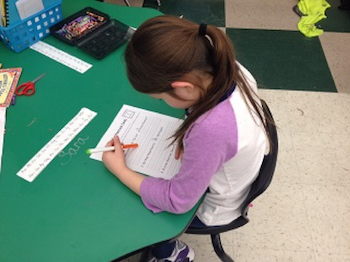I have always enjoyed word finds and word scrambles. They don't take a lot of thought, and they keep me busy when I need something to pass the time. However, when my daughter received one for homework a few years back, it wasn't enjoyable for her or anyone around her. It was very challenging, due the next day, and took her an hour and a half to complete—time that could have been better spent finishing math homework, studying for an upcoming test, or reading a book.
 My husband and I wondered, "What is the purpose of this assignment, and what value could it possibly be providing?" And it made me reflect on the assignments I give my own students. To be respectful of the students' time, I need to be sure I am only assigning work that provides meaningful, authentic practice.
My husband and I wondered, "What is the purpose of this assignment, and what value could it possibly be providing?" And it made me reflect on the assignments I give my own students. To be respectful of the students' time, I need to be sure I am only assigning work that provides meaningful, authentic practice.
Before I hand out a worksheet or assign a number of problems or pages in a book, I ask myself these questions:
- Will I take the time to grade this? If not, what is the value of having students do work on which they will not receive feedback?
- Is it a good use of time? What benefits will the focused effort on the assignment provide? Would students be better off doing something else?
- How will this assignment help children move forward? Answering this helps me validate my decision to have them spend time completing the assigned task.
Most importantly, I have to remind myself that fair is not always equal and that what is good for one student is not necessarily good for another. Gone are the days when I had to follow a practice book in chronological order and pass every worksheet out to every child. Instead, I have the opportunity to provide each student with individualized work that is a valuable use of his or her time.
Did you figure out the scramble? Let's save trees, time, and brainpower by refusing to assign worthless worksheets.
This article might be missing links that were included at the time of publication.

